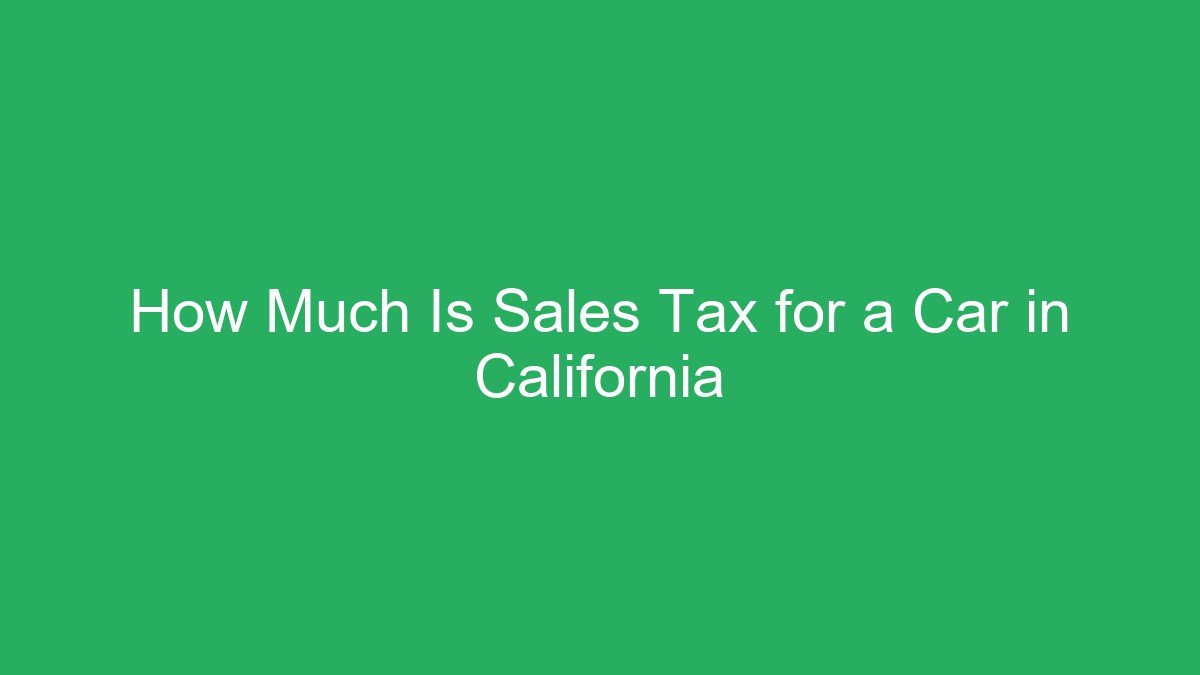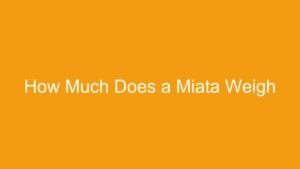
Contents
- How Much Is Sales Tax for a Car in California? Your Complete Guide!
- Understanding the Basics: California’s Sales Tax Rate for Vehicles
- 🛒 Recommended Product
- How to Calculate Your Car Sales Tax in California (Step-by-Step)
- Key Factors That Affect Your Car Sales Tax
- 🛒 Recommended Product
- Tips for a Smoother Car Buying Experience
- Common Mistakes to Avoid
- Frequently Asked Questions (FAQs)
- Conclusion
- 🛒 Recommended Product
- FAQ
How Much Is Sales Tax for a Car in California? Your Complete Guide!
Buying a car in California is an exciting adventure, but navigating the various costs can feel like a puzzle. One of the biggest pieces of that puzzle is sales tax. Don’t worry, you’re not alone if you find it a bit confusing! Many buyers wonder exactly how much they’ll owe and how to factor it into their budget.
We’re here to demystify California car sales tax, breaking it down into easy-to-understand steps. By the end of this guide, you’ll know exactly how to calculate it, what factors influence the cost, and how to avoid common pitfalls. Let’s get started!
Understanding the Basics: California’s Sales Tax Rate for Vehicles
The first thing to understand is that there isn’t one single, static sales tax rate for every car purchase in California. While there’s a statewide base sales tax rate, your actual rate will depend on where the vehicle is registered (which is usually your home address).
🛒 Recommended Product
- The Statewide Base Rate: As of 2024, California’s statewide sales tax rate is 7.25%.
- Local District Taxes (Surtaxes): On top of the state rate, most cities and counties impose additional “district taxes” (also known as local surtaxes). These vary by location, pushing your total sales tax rate higher. This is why a car bought in Los Angeles County will have a different sales tax rate than one bought in Orange County, even if the base price is the same.
Key takeaway: Your car’s sales tax will be at least 7.25%, but it will almost certainly be higher due to local district taxes.
How to Calculate Your Car Sales Tax in California (Step-by-Step)
Ready to crunch some numbers? Here’s the straightforward process to estimate your car’s sales tax:
Step 1: Determine the “Taxable Purchase Price”
This is the foundation of your sales tax calculation. The taxable purchase price is the agreed-upon price of the vehicle before any other fees or charges (like registration, DMV fees, or documentation fees) are added.
- For new or used cars purchased from a dealer: This is typically the price you negotiate, minus any qualified trade-in value (more on this below!).
- For private party sales: This is the actual cash amount you pay to the seller.
Step 2: Find Your Local Sales Tax Rate
This is the crucial part that adds the local flavor! You need to know the combined state and local sales tax rate for the specific city and county where you will register the vehicle.
- Best Resource: The California Department of Tax and Fee Administration (CDTFA) is your official source. You can use their “Find a Sales and Use Tax Rate by Address” tool on their website (search for “CDTFA sales tax rate by address”). Simply enter your home address, and it will give you the precise combined rate.
Step 3: Do the Math!
Once you have your taxable purchase price and your local sales tax rate, the calculation is simple:
Taxable Purchase Price x Your Local Sales Tax Rate = Estimated Sales Tax
Example:
Let’s say you’re buying a used car for $25,000, and your local combined sales tax rate (after checking the CDTFA website for your county) is 9.25%.
- $25,000 (Taxable Purchase Price) x 0.0925 (9.25% as a decimal) = $2,312.50
So, your estimated sales tax on that $25,000 car would be $2,312.50.
Key Factors That Affect Your Car Sales Tax
Understanding these nuances can help you budget more accurately and even save some money!
1. The Purchase Price (What’s Included?)
As mentioned, the sales tax is based on the agreed-upon selling price of the vehicle.
* What’s generally included: The actual price of the car itself, plus any optional accessories installed by the dealer before the sale (e.g., floor mats, upgraded sound system, protection packages if bundled with the car’s price).
* What’s generally NOT included for sales tax calculation: Separate charges like registration fees, license plates, documentation fees, smog certification fees, or extended warranties (if purchased separately from the car’s base price). These are additional costs, but they are not typically subject to sales tax themselves.
🛒 Recommended Product
2. Local Sales Tax Rate (County Specifics)
This is the biggest variable! Your sales tax rate can range from the base 7.25% in very few unincorporated areas up to over 10% in some cities and counties. Always verify your specific rate using the CDTFA website to avoid surprises.
3. Trade-Ins: A Major Tax Saver!
This is a fantastic benefit for California car buyers! If you trade in your old vehicle when purchasing a new one, the sales tax is only calculated on the difference between the new car’s price and your trade-in allowance.
- How it works: Let’s say you’re buying a new car for $35,000 and the dealer gives you $10,000 for your trade-in. Your taxable purchase price becomes $35,000 – $10,000 = $25,000. You only pay sales tax on that $25,000!
- Why it’s important: This can lead to substantial savings. Make sure the dealer clearly itemizes your trade-in value on the purchase agreement.
4. Rebates and Incentives
- Manufacturer Rebates (e.g., cash back from the carmaker): If the rebate directly reduces the selling price of the vehicle before you pay, then the sales tax will be calculated on the lower price. These are generally pre-tax deductions.
- Dealer Discounts: Any discounts offered by the dealership directly reduce the selling price, and therefore reduce your sales tax.
- State/Federal Incentives (e.g., EV rebates): Most often, these are post-purchase incentives that you apply for after buying the car. In such cases, you pay sales tax on the full purchase price, and then receive the rebate later. Always clarify with your dealer or the program administrator.
5. Private Party Sales (Used Cars)
Yes, even if you buy a used car from a private seller, you still have to pay sales tax! When you go to the California Department of Motor Vehicles (DMV) to register the vehicle, they will collect the sales tax based on:
- The purchase price you declare on the Bill of Sale, OR
- The vehicle’s market value (as determined by the DMV), whichever is higher. This is to prevent people from declaring an artificially low price to avoid tax.
Important: Keep a detailed Bill of Sale for private party transactions!
6. Out-of-State Purchases
If you buy a car out of state but intend to register and use it in California, you will generally be responsible for paying California Use Tax, which is equivalent to the sales tax. This is paid when you register the vehicle with the California DMV. There are some nuances and exemptions (e.g., if you paid sales tax in another state, you might get a credit), so it’s best to check with the DMV directly in these situations.
Tips for a Smoother Car Buying Experience
- Always Verify Your Exact Local Rate: Don’t guess! Use the CDTFA website for precision.
- Factor Sales Tax into Your Budget Early: It’s a significant cost. Know your approximate sales tax amount before you start shopping so you don’t get a shock at the dealership.
- Understand Your Trade-In’s Value: If you have a trade-in, remember how it reduces your taxable amount. Negotiate its value carefully.
- Keep Your Bill of Sale Clear: Whether from a dealer or private party, ensure the purchase price, trade-in value, and other fees are clearly itemized.
- Remember Other Fees: Sales tax is just one part of the total cost. Don’t forget registration, license plates, documentation fees, and any other charges that will be added on top. These are separate from sales tax.
Common Mistakes to Avoid
- Forgetting About Local District Taxes: Many people only remember the 7.25% state rate and are surprised by the additional percentage. Always use your precise local rate.
- Miscalculating Trade-In Benefits: Not realizing that a trade-in reduces the taxable amount can lead to overestimating your total cost.
- Ignoring Sales Tax on Private Party Sales: Some buyers mistakenly think private sales are tax-free. They are not!
- Not Budgeting for the Total Cost: Sales tax, registration, and other fees can add thousands to the purchase price. Account for all of them from the start.
- Confusing Sales Tax with Other Fees: Sales tax is distinct from DMV registration, license plate fees, smog fees, or dealer documentation fees. Understand what each charge is for.
Frequently Asked Questions (FAQs)
Q: Do I pay sales tax on a used car in California?
A: Yes, absolutely. Whether you buy it from a dealer or a private party, sales tax applies to used cars.
Q: What if I trade in my old car? How does that affect sales tax?
A: This is a great benefit! In California, sales tax is calculated on the difference between the new car’s price and your trade-in allowance. This can save you a significant amount.
Q: Is sales tax usually included in the advertised price of a car?
A: Almost never. Advertised prices typically show the base vehicle price, sometimes with manufacturer incentives. Sales tax, registration, and other fees are nearly always added on top.
Q: Are electric vehicles (EVs) exempt from sales tax in California?
A: No, EVs are not exempt from sales tax in California. You will still pay sales tax based on the purchase price. However, there are often state and federal rebates or incentives for purchasing EVs, which are separate from the sales tax calculation and usually applied for after the purchase.
Q: When do I pay the sales tax for a car?
A:
* From a dealer: The dealer will collect the sales tax as part of your purchase transaction and remit it to the state.
* From a private party: You will pay the sales tax directly to the California DMV when you go to register the vehicle in your name.
Conclusion
Understanding how much sales tax you’ll pay for a car in California doesn’t have to be a headache. By knowing the base rate, finding your local district tax, understanding the impact of trade-ins, and avoiding common mistakes, you can budget accurately and confidently.
🛒 Recommended Product
Always remember to verify your local sales tax rate using the CDTFA’s official tools and factor this significant cost into your overall car-buying budget. Happy car hunting!
FAQ
Q. What is the base sales tax rate for a car in California?
A. The statewide sales tax rate in California is currently 7.25%. This is the minimum amount of sales tax you will pay on a vehicle purchase before any local district taxes are added.
Q. Does the sales tax rate vary by location within California?
A. Yes, absolutely. In addition to the statewide 7.25%, most cities and counties impose additional district taxes. This means the total sales tax rate you pay can range from 7.25% up to 10.75% or even higher in some specific areas. The exact rate depends on where the car is registered, not necessarily where it’s purchased.
Q. How is the sales tax for a car calculated in California?
A. Sales tax is generally calculated on the agreed-upon purchase price of the vehicle, after any manufacturer rebates or incentives that directly reduce the price. However, the value of a trade-in vehicle does not reduce the taxable amount for sales tax purposes in California; the tax is applied to the full purchase price before any trade-in credit.
Q. Do I pay sales tax on a car if I trade in my old vehicle?
A. Yes, you still pay sales tax on the full purchase price of the new vehicle, even if you trade in your old car. In California, the value of a trade-in vehicle does not reduce the taxable amount for sales tax calculation. The sales tax is levied on the gross purchase price of the car before any trade-in credit is applied.
Q. When do I pay the sales tax on a car in California?
A. If you purchase a car from a licensed dealer in California, the sales tax is typically collected by the dealer at the time of purchase and then remitted to the California Department of Tax and Fee Administration (CDTFA) and the Department of Motor Vehicles (DMV). If you buy a car from a private party, you will pay the sales tax directly to the DMV when you register the vehicle.
Q. What if I buy a car out-of-state but plan to register it in California?
A. If you purchase a vehicle outside of California and bring it into the state for use, storage, or consumption, you will generally be liable for California “use tax” at the same rate as the sales tax. This tax is typically paid to the DMV when you register the vehicle. Credit may be given for sales tax paid to another state, but only up to the amount of California’s use tax.
Q. Does sales tax apply to both new and used cars in California?
A. Yes, sales tax applies to both new and used cars purchased from licensed dealerships in California. It also applies to used vehicles purchased from private parties, in which case it is typically collected by the DMV when the vehicle is registered.
Q. Are there any exemptions for car sales tax in California?
A. While most car purchases are subject to sales tax, limited exemptions exist. For example, vehicles purchased as true gifts (where no money or consideration changes hands) may be exempt, though they are still subject to transfer fees. Also, certain vehicles purchased for specific agricultural uses or by out-of-state residents who register and remove the vehicle from California within a certain timeframe may be exempt, but these are very specific situations and require meeting strict criteria.
Related Articles
How Much Does a Tesla Cybertruck Cost
How Much Does a Tesla Cybertruck Cost? Your Ultimate Guide to Pricing & Purchase The Tesla Cybertruck has captured imaginations with its futuristi…
How Much Is a Tesla
How Much Is a Tesla? Unpacking the Cost of Your Dream EV Dreaming of driving a Tesla? You’re not alone! These innovative electric vehicles have …
Affiliate Disclosure: As an Amazon Associate, I earn from qualifying purchases made through links on this site.















